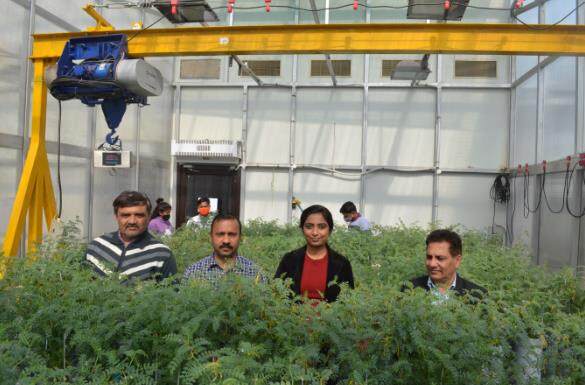Two postgraduate candidates at The University of Western Australia’s Institute of Agriculture have overcome numerous challenges of the pandemic to conduct research from almost 8000km away in India.


In early 2020, around the same time students Agyeya Pratap and Sneha Priya Pappula Reddy received their formal offers to move to Perth and study at UWA, COVID-19 was quickly spreading around the world.
Faced with border closures, local lockdowns and multiple failed applications for travel exemptions, the pair feared their PhD projects would be left in limbo.
But their UWA supervisors stepped in to help them to enrol as temporary offshore students in 2021, which allowed them to commence the first stages of their experiments at the Indian Council of Agricultural Research (ICAR)-Indian Agricultural Research Institute (IARI).
UWA has an ongoing long-term collaboration with IARI, which is a world-class agricultural postgraduate training and research institute in New Delhi, India.
For his thesis, Mr Pratap is investigating the ‘differential expression’ of proteins in wheat varieties when put under increased heat stress during the reproductive period.
With support from his IARI co-supervisors Professor Madan Pal and Dr Viswanathan Chinnusamy, Mr Pratap is currently holding experiments and collecting samples from wheat varieties at their reproductive (flowering) phase.
Mr Pratap’s UWA supervisors are The UWA Institute of Agriculture Director Hackett Professor Kadambot Siddique and Dr Nicolas Taylor.
Ms Pappula Reddy is conducting an analysis of chickpea genotypes when put under terminal drought stress.
More than 80 per cent of chickpea is grown in rainfed conditions where unpredictable rainfall patterns and drought stress are the most common limiting factors affecting growth and productivity in Australia and India.
Through a series of drought experiments, Ms Pappula Reddy is assessing the chickpea plants’ morpho-physiological attributes (such as the plant growth, harvest and seed yield) and then comparing their metabolomic (cellular processes) and proteomic (protein) profiles.
Ms Pappula Reddy’s Indian co-supervisors are Dr Bharadwaj Chellapilla and Professor Madan Pal, and UWA supervisors are Professor Kadambot Siddique, Professor Harvey Millar and Dr Jiayin Pang.



































